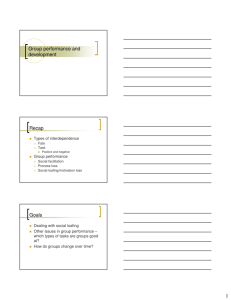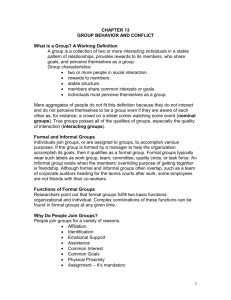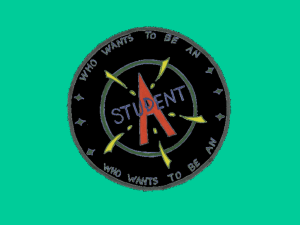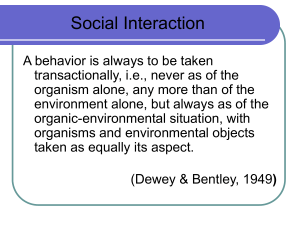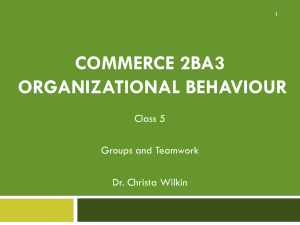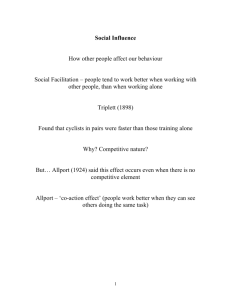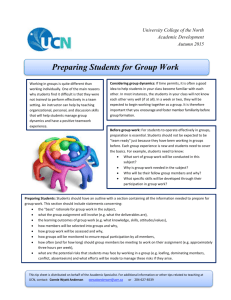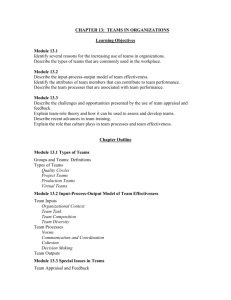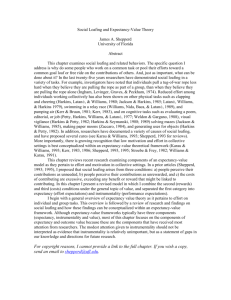Discouraging Social Loafing During Team
advertisement
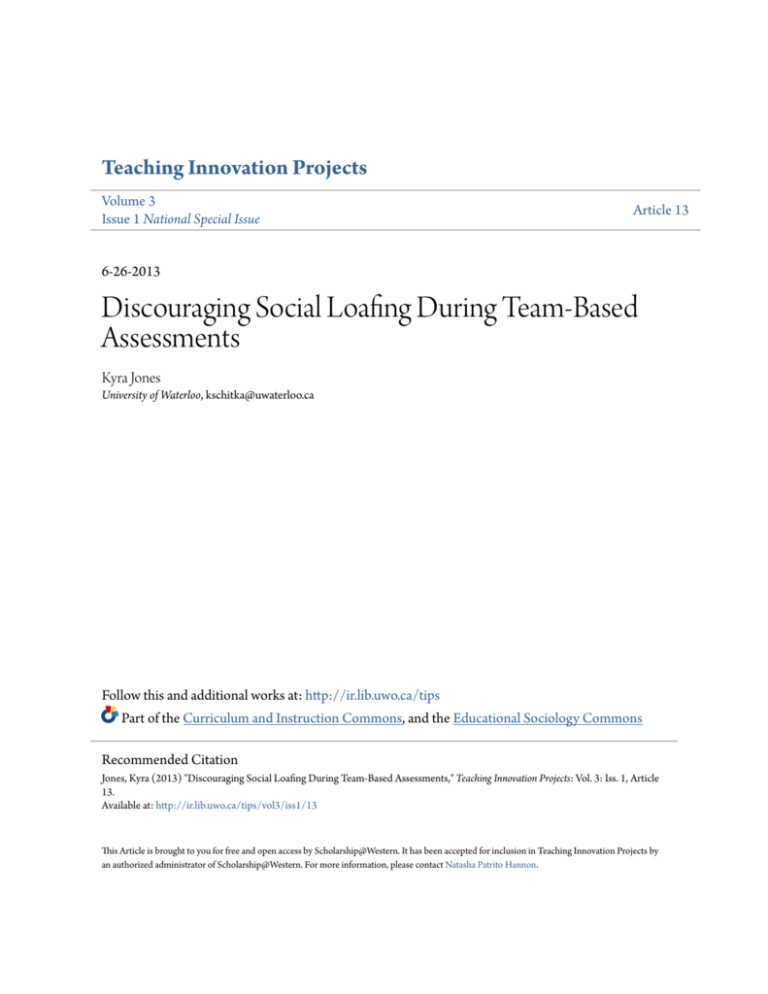
Teaching Innovation Projects Volume 3 Issue 1 National Special Issue Article 13 6-26-2013 Discouraging Social Loafing During Team-Based Assessments Kyra Jones University of Waterloo, kschitka@uwaterloo.ca Follow this and additional works at: http://ir.lib.uwo.ca/tips Part of the Curriculum and Instruction Commons, and the Educational Sociology Commons Recommended Citation Jones, Kyra (2013) "Discouraging Social Loafing During Team-Based Assessments," Teaching Innovation Projects: Vol. 3: Iss. 1, Article 13. Available at: http://ir.lib.uwo.ca/tips/vol3/iss1/13 This Article is brought to you for free and open access by Scholarship@Western. It has been accepted for inclusion in Teaching Innovation Projects by an authorized administrator of Scholarship@Western. For more information, please contact Natasha Patrito Hannon. Discouraging Social Loafing During Team-Based Assessments Summary Group work and team-based learning are essential teaching tools that provide the opportunity for students to practice and expand upon the concepts learned in lectures and reading assignments. Although there are many benefits to group assessment, there are many challenges, especially in the form of social loafers or free-riders who take advantage of the group setting and benefit from the hard work of others. The presence of social loafers in a group can have a negative impact on a group dynamic, create tension within a group, and ultimately prevent other group members from obtaining the learning objectives of the assessment. In this session, participants explore the benefits and challenges of group work, the underlying causes of social loafing, and strategies that can be implemented to discourage social loafing in team-based assessments. The ultimate goal is to encourage participants to include team-based learning in course design and learn how to structure the assessment to minimize the opportunity for social loafing. Keywords team-based assessments, social loafing, group work, team-based learning Creative Commons License This work is licensed under a Creative Commons Attribution 3.0 License. This article is available in Teaching Innovation Projects: http://ir.lib.uwo.ca/tips/vol3/iss1/13 Jones: Discouraging Social Loafing During Team-Based Assessments Discouraging Social Loafing During Team-­‐Based Assessments Kyra Jones, University of Waterloo SUMMARY Group work and team-­‐based learning are essential teaching tools that provide the opportunity for students to practice and expand upon the concepts learned in lectures and reading assignments. Although there are many benefits to group assessment, there are many challenges, especially in the form of social loafers or free-­‐riders who take advantage of the group setting and benefit from the hard work of others. The presence of social loafers in a group can have a negative impact on a group dynamic, create tension within a group, and ultimately prevent other group members from obtaining the learning objectives of the assessment. In this session, participants explore the benefits and challenges of group work, the underlying causes of social loafing, and strategies that can be implemented to discourage social loafing in team-­‐based assessments. The ultimate goal is to encourage participants to include team-­‐based learning in course design and learn how to structure the assessment to minimize the opportunity for social loafing. KEYWORDS: team-­‐based assessments, social loafing, group work, team-­‐based learning LEARNING OBJECTIVES By the end of this workshop, participants will be able to: • describe and discuss the value and purpose of team-­‐based learning in the classroom; • examine the underlying causes of social loafing during team-­‐based assessment; and • devise and assess strategies to prepare team-­‐based assessments that discourage social loafing. REFERENCE SUMMARIES Aggarwal, P. & O’Brien, C.L. (2008). Social loafing on group projects: Structural antecedents and effect on student satisfaction. Journal of Marketing Education 30(3), 255-­‐64. This article summarizes the benefits and challenges of group work by offering a perspective on how social loafing affects students and hypotheses pertaining to structural changes that can be made to group assignments. Aggarwal and O’Brien tested these hypotheses in a study of 420 students resulting in a series of suggested strategies to discourage social loafing that have been statistically verified to reduce the incidence of social loafing. This workshop uses this article to demonstrate the value of group work as well as provide participants with statistically proven methods of reducing social loafing. North, A.C., Linley, A. & Hargreaves, D.J. (2000). Social loafing in a co-­‐operative classroom task. Educational Psychology 20(4), 389-­‐392. This article presents the potential causes of social loafing as well as the benefits and drawbacks of co-­‐operative tasks in the classroom. Specifically, the study looks at group size and compares the contributions of individuals to the team task in large groups versus small groups. It finds that individuals in larger groups make fewer deliverable contributions to Published by Scholarship@Western, 2013 1 Teaching Innovation Projects, Vol. 3 [2013], Iss. 1, Art. 13 the team when compared to those in small groups. This workshop uses this information to illustrate that group size can have an effect not only on individual social loafing or “free-­‐ riding”, but also the effectiveness of the group as a whole. Maiden, B. & Perry, B. (2011). Dealing with free-­‐riders in assessed group work: Results from a study at a UK university. Assessment & Evaluation in Higher Education 36(4), 451-­‐64. The above citation explores six approaches to reducing social loafing that have been studied previously in the literature and directly compares their effectiveness. This will provide a student perspective of which approaches are most effective while demonstrating that some of the negative attitudes students have toward group work are a product of their educational stage and not necessarily due to negative experiences with group work. This article also illustrates the need to teach students how to work as a team both in course curriculum and in student orientation. Pieterse, V. & Thompson, L. (2010). Academic alignment to reduce the presence of ‘social loafers’ and ‘diligent isolates’ in student teams. Teaching in Higher Education 15(4), 355-­‐367. This study explores whether the academic alignment of teams reduces social loafing and compares the differences between self-­‐ and instructor-­‐formed teams. Pieterse and Thompson observed that social loafing occurs most often when stronger team members exclude a weak member of the team. This illustrates the attitude held by many students in more technical fields that teamwork is merely a soft skill and unnecessary for their success, which is a clear misconception. Stark, E.M., Shaw, J.D. & Duffy, M.K. (2007). Preference for Group Work, Winning Orientation, and Social Loafing Behaviors in Groups. Group & Organization Management 32(6), 699-­‐723. The goals of this study was to develop a way to predict social loafing behavior using team member attitudes toward group work, individual competitiveness, and task independence. This study shows that the more an individual values group work, the less social loafing will occur. It also illustrates that wanting to appear successful drives individuals to contribute to the team. This workshop uses this information to demonstrate the importance of teaching students how to work as a team as opposed to expecting that students already know how to effectively work as a team. CONTENT AND ORGANIZATION Duration Subject Activity Purpose [min] 2 Introduction Introduce yourself to participants To familiarize the and discuss the overall objectives participants with the and structure of workshop. overall purpose of the workshop. http://ir.lib.uwo.ca/tips/vol3/iss1/13 2 Jones: Discouraging Social Loafing During Team-Based Assessments 5 Short Ask the participants the following: Discussion • What are the top two benefits and top two challenges of group work in the classroom? Allow for a brief discussion with contributions from the participants. After the discussion, re-­‐focus the group and briefly describe the points that were not mentioned during the discussion. When re-­‐ iterating a point brought up during discussion, provide the participant with validation for contributing an idea and expand upon how it was previously discussed. Key points for the participants to contribute during the discussion include the following benefits and challenges. Benefits: • Skills development • Interpersonal • Workplace preparation • Student learning • Using active-­‐learning to foster higher-­‐level learning • Engaging students in large classes • Constructive criticism • Giving appropriate and constructive feedback to others • Responding to feedback from peers Challenges: • Controlling student learning • Instructor loses some control • Potential for imbalance of learning between group members • Assessment design • Potential to reward students Published by Scholarship@Western, 2013 To familiarize the participants with the idea that group work is valuable despite the challenges that both the instructor and the students sometimes experience. 3 Teaching Innovation Projects, Vol. 3 [2013], Iss. 1, Art. 13 5 Short Presentation: Explaining Social Loafing in Group Work 10 Discussion: Self-­‐Reflection of Participants’ Attitudes Towards Group Work http://ir.lib.uwo.ca/tips/vol3/iss1/13 who do not contribute • Student anxiety about achievement • Student attitude toward group work • Resentment towards members who do not contribute Introduce the concept of social loafing in the context of educational literature, the prevalence of social loafing, and the effect it has on students. For a more expansive definition, please refer to Aggarwal & O’Brien, 2008; Farrante et al, 2006; North, Linley, and Hargreaves, 2000; and Pieterse & Thompson, 2010). Engage the participants in a discussion about their attitudes towards group work, based on their own experiences. Facilitate the discussion by providing discussion prompts and contributing your own experiences and attitudes surrounding group work and social loafing as necessary. Discussion Prompts: 1. What feelings do you have toward group work in the classroom? (ie: as a student, as an instructor) 2. Have you encountered a situation in which social loafing affected group work? 3. How did social loafing affect the team? 4. Has an experience with social loafing shaped your current perspective with respect to group work? To familiarize the participants with the definition of social loafing in an educational context, illustrate that it is a phenomenon seen even in young children, and the negative effect that social loafing has on students’ attitude towards teamwork. To have participants reflect on their own experience as a team member. Encourage participants to recall completing team-­‐based assessments either as a student or instructor and explore their personal perspective of group work from both sides. This will make the issue of social loafing more personal to the participants, allowing them to see value in taking the time to address this issue when designing team-­‐based assessments. 4 Jones: Discouraging Social Loafing During Team-Based Assessments 10 15 Minutes Presentation: Causes of Social Loafing in Group Work Ask participants to share their personal experiences and encourage them to discuss the effect of social loafing on team dynamics. Explain the various underlying causes of social loafing reported in the academic research and literature. Ask participants to offer examples of previous experience they have with each cause of social loafing. Break-­‐out Break the participants into small Brainstorming groups of approximately 4 to 5. In this exercise, ask participants to think back to the previous discussion about their previous experiences with group work. Ask participants to consider the following questions: • What were the structural constraints of the assessment in both positive and negative experiences? • How can you use this experience, both positive and negative, to change the set-­‐up design of future team-­‐based assessments to help discourage social loafing? • What factors would you need to think of that may be specific to your discipline? Take approximately 15 minutes to break out into smaller groups and discuss these questions. Try to come up with potential solutions that can help discourage social loafing, particularly solutions that can be used when designing a team-­‐based Published by Scholarship@Western, 2013 Identify the factors that cause social loafing to occur during team-­‐based assessments. Emphasize that the reasons for social loafing are not always because the student is selfish or does not want to participate, but can be a function of group dynamics. After learning about what can contribute to social loafing, this section encourages participation by asking attendees to coming up with viable solutions to help discourage social loafing based on their own experiences. 5 Teaching Innovation Projects, Vol. 3 [2013], Iss. 1, Art. 13 25 Large Group Discussion: Strategies to Discourage Social Loafing 5 Conclusion and Summary 10 task, such as limiting group size or defining the scope of project. Ensure that groups are working on task by walking around the room and engaging the groups in conversation to keep everyone on topic and to determine when discussions are dying down. After approximately 10 minutes, reconstitute the larger group and facilitate a discussion of the participants’ ideas. Discussion Prompt: 1. As an instructor, what structural constraints of an assessment could you modify to discourage social loafing during a group assessment? Ask each group to share one key strategy they discussed in the brainstorming session. After each idea is presented, talk about the strategy in context of the academic research on social loafing. Ask participants to discuss the positives and negatives of each strategy they discuss. Facilitate and guide the discussion to ensure that all or most strategies relevant to discouraging social loafing are introduced to the participants. Summarize the key aspects of the workshop and discuss the five strategies to keep in mind when designing group assessments to help discourage social loafing. Continue the discussion that began in the breakout groups as a large group to collectively devise strategies that can be used to design assessments that discourage social loafing. To summarize the workshop and provide a take home message -­‐ five aspects of assessment design to consider when creating team assessments. Question and Respond to any questions or Allow the participants to Answer comments participants may have clarify any aspects of the about social loafing and strategies to workshop and provide http://ir.lib.uwo.ca/tips/vol3/iss1/13 6 Jones: Discouraging Social Loafing During Team-Based Assessments discourage social loafing. See input in the form of a Appendix A for a sample handout to comment. distribute. Invite participants to ask questions and provide comments about social loafing and how to prevent it during team assessment. PRESENTATION STRATEGIES The goal of the workshop is to increase the awareness surrounding the issue of social loafing and provide tangible solutions that can be applied to assessment design in various disciplines and class sizes. This workshop has been prepared to allow for substantial discussion and interaction between the participants in small groups and as a large group. Because there is a large degree of variation in creating assessments for different disciplines, small and large group discussions are vital. This allows individuals from different fields to discuss the particular challenges they face when preparing a group assessment and generate ideas to help overcome these challenges with other participants. This cross-­‐ collaboration often allows instructors to learn about approaches taken in other disciplines and by other instructors and apply this to their own teaching. The facilitator of the workshop will need to keep groups focused on the topic at hand during discussions and facilitate the large-­‐group discussion. The facilitator will also need to employ the didactic lecture approach to introduce concepts such as what social loafing is and its causes, but when presenting strategies to discourage social loafing, a discussion format can be used to keep the workshop more casual and create a feeling of collaboration. ADDITIONAL REFERENCES Arterberry, M.E. (2007). Collaborative problem solving in five-­‐year-­‐old children: Evidence of social facilitation and social loafing. Educational Psychology 27(5), 577-­‐96. Cestone, C.M., Levine, R.E. & Lane, D.R. Peer assessment and evaluation in team-­‐based learning. In Michaelson, L.K., Sweet, M., Parmelee, D.X. (Eds.), Team-­‐Based Learning: Small-­‐group learning’s next big step (69-­‐78). San Francisco: Wiley Periodicals, Inc. Cooper, M.M. (1995). Cooperative Learning: An approach to large enrollment eourses. Journal of Chemical Education 72(2), 162-­‐64. Ferrante, C.J., Green, S.G. & Forster, W.R. (2006). Getting more out of team projects: Incentivizing leadership to enhance performance. Journal of Management Education 30(6), 788-­‐97. Trentin, G. (2009). Using a wiki to evaluate individual contribution to a collaborative learning project. Journal of Computer Assisted Learning 25, 43-­‐55. Published by Scholarship@Western, 2013 7 Teaching Innovation Projects, Vol. 3 [2013], Iss. 1, Art. 13 APPENDIX A: Handout Discouraging Social Loafing During Group Assessment Strategies to Discourage Social Loafing 1. Scope of Project • Break assessment into discrete, evaluated steps 2. Group Size • Ensure group size corresponds to complexity of assessment • Use smaller groups of 4-­‐5 students 3. Peer Evaluations • Weight the peer assessment so students take it seriously • Set expectations • Let students be involved in designing the peer evaluation • Prepare students for evaluation by teaching students how to give appropriate and constructive feedback 4. Student Satisfaction with Teamwork and Group Member Contributions • Incorporate a reporting system so students can report problems and challenges • Provide roles within the group, one being to keep everyone on task and ensure work is divided equally Tips and Reminders • Be aware of social loafing and be prepared! • Structural set-­‐up factors are relatively easy to implement, even in large classes. • Well-­‐designed assessments create an environment conducive to student learning in a team setting Relevant References for Further Information Aggarwal, P. & O’Brien, C.L. (2008). Social Loafing on Group Projects: Structural Antecedents and Effect on Student Satisfaction. Journal of Marketing Education, 30(3), 255-­‐64. Arterberry, M.E. (2007). Collaborative Problem Solving in Five-­‐Year-­‐Old Children: Evidence of Social Facilitation and Social Loafing. Educational Psychology, 27(5), 577-­‐96. Cestone, C.M., Levine, R.E. & Lane, D.R. Peer Assessment and Evaluation in Team-­‐Based Learning. In Michaelson, L.K., Sweet, M., Parmelee, D.X. (Eds.), Team-­‐Based Learning: Small-­‐ http://ir.lib.uwo.ca/tips/vol3/iss1/13 8 Jones: Discouraging Social Loafing During Team-Based Assessments Group Learnings Next Big Step (69-­‐78). San Francisco: Wiley Periodicals, Inc. Cooper, M.M. (1995). Cooperative Learning: An Approach to large Enrollment Courses. Journal of Chemical Education, 72(2), 162-­‐64. Ferrante, C.J., Green, S.G. & Forster, W.R. (2006). Getting More out of Team Projects: Incentivizing Leadership to Enhance Performance. Journal of Management Education,30(6), 788-­‐97. Maiden, B. & Perry, B. (2011). Dealing with Free-­‐Riders in Assessed Group Work: Results from a Study at a UK University. Assessment & Evaluation in Higher Education, 36(4),451-­‐64. North, A.C., Linley, A. & Hargreaves, D.J. (2000). Social Loafing in a Co-­‐operative Classroom Task. Educational Psychology, 20(4), 389-­‐392. Pieterse, V. & Thompson, L. (2010). Academic Alignment to Reduce the Presence of ‘social loafers’ and ‘diligent isolates’ in student teams. Teaching in Higher Education,15(4), 355-­‐367. Stark, E.M., Shaw, J.D. & Duffy, M.K. (2007). Preference for Group Work, Winning Orientation, and Social Loafing Behaviors in Groups. Group & Organization Management, 32(6), 699-­‐723. Trentin, G. (2009). Using a Wiki to Evaluate Individual Contribution to a Collaborative Learning Project. Journal of Computer Assisted Learning, 25, 43-­‐55. Published by Scholarship@Western, 2013 9
